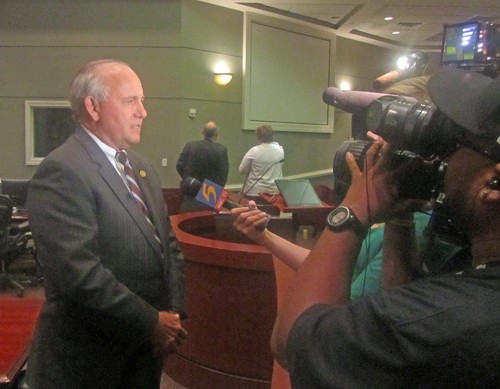“It’s a late date to be saying it, and I mean no disrespect to the people of Cleveland, who I’m sure are a fine people and a spiritual people — but Cleveland ain’t ever gonna be Memphis.”
— Memphis’ Sam Phillips at the first Rock and Roll Hall of Fame Banquet, 1986, via Stanley Booth’s Rythm Oil
“Blow it up! Blow it up! Blow it up before Johnny Rotten gets in!”
— Columbus’ Ron House on “RnR Hall of Fame,” 1995, from Thomas Jefferson Slave Apartments’ Bait & Switch
Those two public pronouncements from defiantly independent regional music icons bookend a bitter process in the world of Memphis music. Sun Records founder Sam Phillips, one of the first inductees, was voicing his disapproval on having his hometown passed over for the museum site in a city with less claim on the music but a bigger public check to offer.
Nearly a decade later, with the Rock and Roll Hall of Fame finally set to open in Cleveland, Ohio punk/indie mainstay Ron House made his own principled stand against the project, a defiant punk “no” in the face of a civic celebration.
A 66-second spoken rant with noise accompaniment, Thomas Jefferson Slave Apartments’ “RnR Hall of Fame” was historic on impact. Railing against an institution that, in his worldview, doesn’t “induct” but “indict,” House protests imagined future exhibits of a venue he sees as inherently exploitative, snarling with comic audacity: “I don’t want to see Eric Clapton’s stuffed baby! I don’t want to see the shotgun of Kurt Cobain!”
House had been an Ohio music-scene fixture for more than a decade at that point, spending much of the ’80s as frontman for Great Plains, which released three albums in the middle of that decade on the notable national indie label Homestead Records. Lower-key, brainy, mildly rootsy, Great Plains were roughly similar to better-known regional indie stalwarts such as San Pedro, California’s Minutemen and Phoenix’s Meat Puppets. They doted on Midwestern history (“Rutherford B. Hayes,” “Black Sox Scandal”), local-scene color (“Columbus Dispatch,” “Letter to a Fanzine”), and other cultural items (“Dick Clark,” “Martin Luther King and Martin Luther Drinking,” “Alfalfa Omega”). It was a pre-internet, get-in-the-van/fanzine era in which most cities had one or two indie/punk bands for the local scene to rally around. The Great Plains were Columbus’ entry — and a good one.
After nearly a decade since Great Plains’ 1987 finale Sum Things Up, apparently unaware that musicians are supposed to mellow as they get older, House reemerged with Thomas Jefferson Slave Apartments — a louder, coarser, angrier outfit where House’s more agitated vocals (and outlook) were matched by the under-recognized guitar work of partner Bob Petric.
“RnR Hall of Fame” is such an eternal moment that it has tended to obscure the rest of the record that surrounded it, but Bait & Switch is a legit lost classic from an era when indie and punk bands were ascendant — so much so that this cheap, confrontational album was actually marketed by major-label-connected American Recordings, then making a name for itself via its work with Johnny Cash.
The album showcased Stooges-style Midwestern proto-punk — a sneaky-smart blend of grimy guitars, yowling vocals, and a prowling mid-tempo pace.
“I was born at the start of this song/I never thought I would last this long,” House mewls on the opening “My Mysterious Death (Turn It Up),” which sets the tone. “Down to High Street” is a rock-show call to arms, so to speak: “There’s a time for getting drunk alone/But not now/There’s a time for staying sober at home/But not now.” “Negative Guest List” (“Even if I pay I can’t get in”) puts House in a confrontational position against a scene he confesses he needs. “Quarrel With the World” sums up the mood.
Best of all — discounting “RnR Hall of Fame” — is “Cheater’s Heaven” — a delirious, drunken tale of a married man on the hunt for an illicit encounter: “The woman was long-legged, red-haired, and married/We staggered time and toasted cemeteries/We mourned the loss of lime in cheap liquor/We wondered which way to our homes was quicker.”
A follow-up, 1997’s too-appropriately titled Straight to Video, didn’t have the benefit of American’s muscle or the same kind of reach, though it’s a very good record on its own less momentous terms — less a document of the band’s musical worldview than a series of snapshots of low-rent “love” life. The band’s apparent swan song, 2000’s No Old Guy Lo-Fi Cry, was nonexistent to anyone but scene diehards. The band went kaput soon after, but most members remained in the Columbus area and have played the occasional reunion show. Now, apparently, they’re back on the road: The Thomas Jefferson Slave Apartments gig that showed up on the Hi-Tone Café schedule awhile back — and is set for this weekend — is one of the most unlikely but most interesting bookings on the local calendar this year.
Thomas Jefferson Slave Apartments with Sharp Balloons and Flamin’ A’s
Hi-Tone Café
Friday, June 1st
9 p.m.; $5



